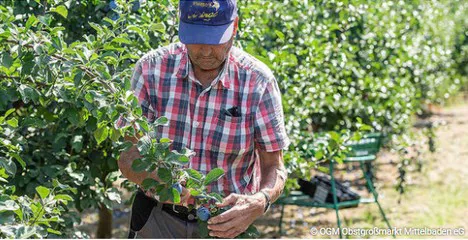The plum season in Baden-Württemberg is starting earlier than ever this year: The first plums have been delivered to the Baden fruit wholesale markets since last week. "After a sales volume of 11,700 tons last year, our cooperatives are expecting between 10,000 and 11,000 tons this year - a medium volume," Dr. Roman Glaser, President of the Baden-Württemberg Cooperative Association (BWGV), reports. The Baden producer markets in Bruchsal, Oberkirch and Vogtsburg account for around 75 percent of the cooperative marketing volume, while the Württemberg markets account for 25 percent. The total harvest in Baden-Württemberg - i.e. including the self-marketers - should be between 16,000 and 17,000 tonnes. Glaser expects the fruit to be of good quality.
The plum season began in mid-June with the early varieties "Ruth Gerstetter", "Juna" and "Herman", which were delivered to OGM Obstgroßmarkt Mittelbaden in Oberkirch. Shortly afterwards, deliveries were also made to Obst- und Gemüse-Absatzgenossenschaft Nordbaden in Bruchsal and to the Erzeugergroßmarkt Südbaden in Vogtsburg. At the beginning of July, "Katinka", the first high-volume variety, will be launched on the market. A regular year yields about 500 tonnes.

Night frost and irrigation
From mid-July onwards, "Cacaks Schöne" will be harvested, which is an important main variety in Baden-Württemberg, with up to 1,600 tons. In 2020, the fruit growing companies in Baden-Württemberg had to cope with several frost events. Five consecutive nights of frost occurred at the end of March and beginning of April for early flowering. After Easter, night frosts of up to -4oC led to damage to young fruit. Early varieties tended to be affected more severely, so that the cooperatives as a whole expect only average sales volumes until the end of marketing in October.
Fortunately, the plants then got a lot of sunshine and, although it led to higher expenditure on the irrigation of the orchards, it also resulted in a very aromatic fruit. Over the past eight years, between 7,000 and 15,000 tonnes have been marketed annually through the cooperatives in Baden (except in 2012: 6,100 tonnes; and 2017: 3,000 tonnes). During the same period, marketing in the Neckar region and on Lake Constance was between 2,000 and 4,000 tonnes.
For more information:
www.wir-leben-genossenschaft.de
